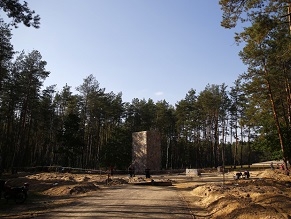|
World Jewish News

Archaeologists dig in the perimeter of a Nazi death camp. (photo credit:KACPER PEMPEL / REUTERS)
|
Moscow ‘disappointed’ over exclusion from Sobibor museum project
02.08.2017, Holocaust The Russian Foreign Affairs Ministry has accused Poland of attempting to rewrite history after being excluded from an international project to build a museum and memorial on the grounds of the Sobibor Nazi death camp in eastern Poland.
A statement from the ministry on Monday expressed Moscow’s disappointment over Warsaw’s “refusal to include Russia in the project,” which includes plans to build a new memorial and visitor center.
“We see this decision as unethical in terms of the historical truth,” the statement read. “It is hard to deny that Russia’s involvement in building a new Sobibor memorial and museum is absolutely justified.
There is no rational explanation for ignoring historic facts and this must not go unnoticed by the global community.
“The intention to prevent Russia from participating in the project is part of Warsaw’s openly demonstrated anti-Russia sentiment and Poland’s attempts to impose its own understanding of history by belittling the Soviet Union’s and the Red Army’s role as liberators during WWII.”
The statement said Russia was invited to participate in the initiative in 2013.
“Russia responded to the invitation in the affirmative and expressed willingness to be actively involved in the commemoration of the extermination camp victims, including participants of the heroic 1943 revolt organized by Soviet prisoners of war and led by Red Army officer Alexander Pechersky,” it said.
Some 250,000 Jews were murdered at Sobibor. On October 14, 1943, Soviet-Jewish prisoner of war Pechersky led some 600 prisoners in a revolt in which they tried to escape. Between 100 and 120 prisoners survived the revolt and 60 of them survived the war. After the uprising, the Nazis bulldozed the area and planted it over with pine trees to conceal their crimes.
The ministry charged that Warsaw had stalled its decision regarding Moscow’s involvement in the project, “conditioning Russia’s participation on yet more terms which still have not been communicated to Russia.”
In July, Warsaw sent an official message stating that at a meeting on June 12 and 13, 2017, the project’s international managing committee decided to continue the same collaborative composition that had existed for the past 10 years.
That consisted of representatives from Poland, Israel, the Netherlands and Slovakia.
Poland’s Culture Ministry told the Russian TASS news agency on Tuesday that the committee had unanimously agreed to continue its current composition, without the addition of any new partners.
The ministry also told TASS, “The decision of the International Committee is not a rejection of other forms of Russia’s participation in the project,” mentioning Russia’s planned participation in events marking the 75th anniversary of the Sobibor uprising.
The Polish Culture Ministry did not respond to a request for comment from The Jerusalem Post by press time.
Plans for the site include protection of mass graves containing the ashes of victims of the former death camp.
The architectural plans call for the area of the mass graves to be covered with a layer of geotextile, a type of stabilizing ground cloth often used in road work and engineering projects. It will be covered with crushed white marble. The work will take place under the supervision of the Rabbinical Commission for Jewish Cemeteries in Poland.
The museum building will have usable area of some 760 square meters, about 8,200 sq. ft. It will include an exhibition hall with a permanent display documenting the history of the extermination camp in Sobibor; a lecture hall; a room for collections; a reception area; and a service point for visitors, Agnieszka Kowalczyk-Nowak, a spokesperson for the Museum at Majdanek, told JTA earlier this year.
By Tamara Zieve
JPost.com
|
|
